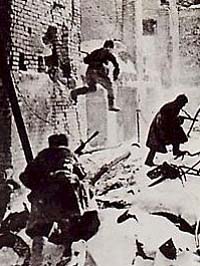Understanding History
The MainstreamAs an interpretive concept, the "mainstream" is precarious. And why? The mainstream is that one current of the past which leads to ourselves. It is the part of the past which is directly connected to the present, and is thus of classroom interest to the present, it naturally makes up the self-introductory basic course in the subject. In the end, its study teaches us no more than what we already were. The issue comes up very clearly in art history. Here is an exceptionally candid preface by the art connoisseur Bernard Berenson, who begins by saying that "significant events are those events which have contributed to making us what we are today," and continues:
Art history must avoid what has not contributed to the main stream, no matter how interesting, how magnificent in itself. It should exclude, for instance, most German and even Spanish and Dutch art. It should dwell less and less on Italian art after Caravaggio, and end altogether by the middle of the eighteenth century with Solimena and Tiepolo. Except for Ribera, Murillo, Velasquez and Goya in Spain, and Schöngauer and Dürer and Holbein in German lands, the painters of these countries are neither in the main line of development nor of universal appeal to cultivated Europeans.
[Schöngauer, in case you wondered too, was a northern Renaissance religious painter and engraver of the last half of the 15th century, the teacher of Matthias Grünewald, whose 22 minutes of fame arrived with Hindemith's tone triptych Mathis der Maler. Schöngauer was a resident of Alsace, a pupil of the Flemish painter von der Weyden the Elder, and admired in Italy as "Bel Martino," all of which probably mitigates his Germanness and makes him, exceptionally, accaptable to a Berenson's Italianate taste].
History as such wants to know, not only what part of the past we still inhabit, but what parts of the past others may inhabit. Of for that matter, the parts that nobody may inhabit. The drying up of a cultural stream, like the silting of a harbor and a consequent shift in trading patterns, is important in its way, even in presentist terms, just as the study of failed revolutions is important for the understanding of successful revolutions. What enters into the success of a culture, or the the fertility of an innovation in brush technique? Why do the English drive on the wrong side of the road? These are among the questions asked by history. To answer them, we need an understanding of the present that is not based solely on the successes of the present. Only from that broader basis can the successes of the present be understood. Art criticism is calculated not to give us that. It is poised to school us in something much narrower.
China
Confucianism is said to have "triumphed" over other species of statecraft thought under the patronage of Emperor Wu of Han, in or around the year 0136. Did it? Did rival views have no further effect on the later Chinese mind, even if we limit "Chinese mind" to the mind of the serving elite, the lackeys and henchmen of Empire? Was the "Confucianism" that Emperor Wu made mandatory for the training of the serving elite anything that Confucius here would have recognized? Here is an undoubted mainstream, but one that by no means occupies all the space from one shore to the other, and one that emerges by a very crooked path indeed from its supposed and official origins.
The real mainstream is the whole stream. The arbiters of taste occupy an orthodox stripe of the stream, but a stream which, compared to the whole stream, is not much more than a puddle, an abandoned well. The classic metaphor is that of the Jwangdz:
The time of the autumn floods had come, and the hundred streams poured into the Yellow River. Its current swelled until, looking from bank to bank or from one island to another, you could not tell a horse from a cow. And the Lord of the River was delighted, thinking that all the beauty of the world was contained within himself. Following the current, he traveled east, and came at last to the North Sea. There, peering into the east, he could see no end to the water.
At this, the Lord of the River wagged his head and rolled his eyes. Gazing far off in the ocean at the god Rwo, he sighed and said, The common saying has it, "He has heard the Way a hundred times, and thinks no one is as good as he." It applies to myself. In the past I heard men slighting the wisdom of Confucius or belittling the righteousness of Bwo-yi, though I never believed them. Now, however, I have seen your unfathomable vastness. If I hadn't come to your gate, I would have been in danger of being forever ridiculed by the Teachers of the Greater Method."
Rwo of the North Sea said, You can't speak of the ocean to a frog in a well: he is limited by his habitation. You can't talk of ice to a summer insect: he is confined to a single season. You can't discourse of the Way with a conventional scholar: he is shackled by his doctrines. Now you have come out beyond your banks and borders and have beheld the great sea, so you realize your own insignificance. It will now be possible to talk to you about the Great Principle.
The history of art is more than the history of taste in art, and history itself is more than the streams which pour into history. There are major events which remain major even if, as with the Hittites, they are celebrated by no posterity, and have no memory clientele, at the present moment.
Europe
And the clientele of the present moment are liable to violent change. Fischer cites the case of Geoffrey Barraclough, a mediaevalist who was pushed by modern events into modern history. It was his notion that in 1943 all previous European history became irrelevant:
For me, it was the Russian victory at Stalingrad in 1943 that made a total revision of European history imperative. I realized with consternation that three years in an English and two years in a German university had left me for all practical purposes ignorant of eastern European history, save at a few points where it caught the limelight . . . I had some notion of the place of the Emperor Charles IV in history, but knew little more than the names of his contemporaries, Louis the Great of Hungary and Casmir the Great of Poland. I had read all the surviving letters of St Boniface, the apostle of the Germans, but nothing of St Cyril and St Methodius, the apostles of the Slavs.
The frog is here relieving his consternation by jumping into a different well. A less mainstream training would have prevented this sense of disorientation, and given a better answer to the cultural shock of 1943 than the cultural recoil of "totally revising" the content of European history. So we may choose to say: The final agument against the mainstream as an interpretive concept is that it shifts too fast.
Somewhere in the landscape of the mind, there is a ridge from which the mainstreams of all the posterities are visible, along with those streams which vanish into the sands and are no more. Historians take up their position on that ridge, watching the various beams of self-congratulatory limelight play across the landscape, but not dazzled by having any one of them shine full in the eye. They watch, comprehendingly, as all the mainstreams in the end merge in the Great Sea.
Readings
- Bernard Berenson. Aesthetics and History. Doubleday 1954. The quote is from p257f
- Geoffrey Barraclough. History in a Changing World. Oxford 1955. The quote is from p217
7 Nov 2000 / Contact The Project / Exit to Outline Index Page



